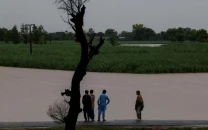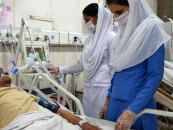Govt plans subsidy on LNG supply to fertiliser units
Concession is likely to keep fertiliser prices for farmers to a minimum

Keeping in view the natural gas shortage, the government was planning to provide LNG to fertiliser plants that were closed in the absence of gas. PHOTO: FILE
The government is mulling over providing subsidy on imported liquefied natural gas (LNG) supply to fertiliser plants that have been shut because of dearth of domestically produced natural gas - a significant move that will make urea available to farmers at affordable prices.
“LNG is expensive compared to natural gas produced in the country and, therefore, the government is planning to subsidise the imported gas for fertiliser manufacturing plants to keep the commodity’s prices to a minimum for the farmers,” said an official.

Four fertiliser plants connected to the pipeline network of state-owned Sui Northern Gas Pipelines Limited (SNGPL) have been encountering gas supply problems because of shortage since the days of previous Pakistan Peoples Party government.
On Monday, SNGPL, Sui Southern Gas Company and Pakistan State Oil signed a tripartite agreement to share risks and pave the way for LNG purchase from Qatar in a government-to-government arrangement.
Read: Moscow to lend $2b for LNG pipeline
Petroleum and Natural Resources Minister Shahid Khaqan Abbasi has already announced that local gas would be available for domestic consumers only whereas other consumers including the fertiliser and industrial units would have no energy supplies in the upcoming winter season.
Keeping in view this situation, the government was planning to provide LNG to fertiliser plants that were closed in the absence of natural gas. This was told to the cabinet in a meeting held on September 15.
However, the meeting participants noted that since LNG cost more than natural gas, its supply to fertiliser plants would possibly be subsidised. Already an amount of Rs25 billion has been set aside in the current fiscal year for subsidising the imported urea, which could potentially be diverted and used for curtailing the cost of locally manufactured fertiliser.

In the cabinet meeting, it was outlined that in order to cut the cost of production, a Rs20-billion fund would be created with equal contribution from federal and provincial governments to provide di-ammonium phosphate (DAP) fertiliser to the farmers at discounted prices. This would result in bringing down the price by more than Rs500 per 50kg bag.
However, officials say the federal government may not succeed in setting up the fund as provinces, mainly Sindh and Khyber-Pakhtunkhwa, were unlikely to offer the required support as ruling political parties in these two provinces had termed the recent prime minister’s agricultural package a tool for political rigging.
It was decided in the cabinet meeting that concessionary tariffs of Rs10.35 per unit for peak hours and Rs8.85 per unit for off-peak hours for agricultural tube wells, which were announced in 2013, would continue to remain in place during 2015-16. This will lead to a federal government subsidy of Rs7 billion for tube well owners.
In an attempt to further facilitate the tube well owners, the government has allowed them to pay only current bills and delay the clearance of arrears until the end of December.
Read: OGRA close to determining LNG price
This will be supplemented with grants from the provincial governments that will bear the cost of general sales tax amounting to Rs7 billion.
Published in The Express Tribune, September 23rd, 2015.
Like Business on Facebook, follow @TribuneBiz on Twitter to stay informed and join in the conversation.



















COMMENTS
Comments are moderated and generally will be posted if they are on-topic and not abusive.
For more information, please see our Comments FAQ